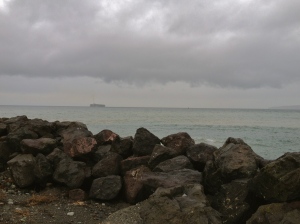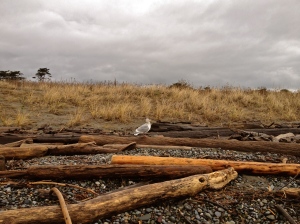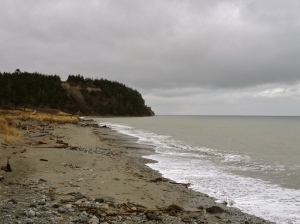Several days ago we stood on a beach, looking out across the Salish Sea, our shoulders hunched against the briny wind. Brendan turned to me and said, "Our lives are changing."

Not so many years ago, this sentence would have been "We are changing our lives." Hard-wired for motion, we grew restless every two or three years. We switched jobs, home loans, states, cities, countries with ease - not seeking anything better, not out of dissatisfaction for where we were or what we had - but out of a spirited curiosity, a determination to embrace adventure. And like magic, the opportunities appeared. A better-paying job offer materialized after I submitted a letter of resignation to my current employer; buyers snapped up our house before it went the market; Permanent Residency was granted when we'd hoped only for six-month work permits. It seemed that each time we decided to leap without a net, the Universe said "Go on! I got this."
But then we landed here, in this green and gray city of whey-faced, over-caffeinated hipsters and North Face puffy-coated soccer moms and we fell in love. We fell in love with the city's sparkling waters and downy peaks, its bookstores and beer, its endearing neighborhoods of Arts and Crafts bungalows and small-batch gourmet cupcake joints. We found fulfilling work, a cheap rental in a great neighborhood, created a community of friends and thought, "Right. We're home, let's set down stakes and dig in." And dig in we did. Five years in one city is a record for our nearly-21 year union. And it felt right. Mostly. Maybe. Sort of. Not really.
Here's my Solstice blog post. I'm all "It's been a pretty rough year, but now the light is shining again" Zen-like reflective, thinking the year had closed and I could move on, right? I can't reread it. I'm afraid I might cry and not get through the rest of what I want to write tonight. The thing is, in the final hours of the year that was, our settled little life shattered.
I am easily disappointed by people. Classic introvert that I am, it's a major character flaw. But I don't want to be that person, so I work to pull my heart out, open it and offer up bits to strangers and loved ones alike. Then something happens and all my demons snigger and shout "See? See! Just like we've said all along. People Suck!"
Maybe that's why I read fiction. Make-believe characters are far more satisfying than the real things. And if they aren't, I can toss the book aside and move on to the next. Or, if I make my way to the end, I can pound out a review, holding the author entirely responsible for the flaws in his characters.
And it's very likely why I write fiction. But this isn't to suggest that the fiction writer is a puppeteer stringing her characters along. When you are fully engaged in your story, writing from a place of authenticity, your characters lead you. I've spent six months getting to know my protagonist and just this morning did she finally tell me what she wanted. I've asked her since day one, knowing as any good student of writing does that all characters want something and it's the writer's job to put obstacles in the way of those desires - that's what makes a plot. But there sat my protagonist with a phone cradled to her ear, listening to a friend sharing news that will allow her to make choices, and changes, to her life, to live where and - after a fashion - how she wants. Suddenly she's faced with deciding what that really is. And telling me, the writer, in the process. I just had to have the patience to let her tell her story and to remain silent so I wouldn't muck it up.
Last Saturday I participated in an extraordinary workshop, "Salon at SAM", co-sponsored by the Seattle Art Museum and Hedgebrook, a retreat for writers on Whidbey Island. We selected a work of art from the SAM exhibit Elles: Women Artists from the Centre Pompidou, created a character based on that work and wrote a monologue in his or her voice.
I selected a short, continuously looped black and white film. The artist filmed herself on a beach, rotating a hula hoop around her hips. You couldn't see her head, only her naked, beautiful body. And the hula hoop wasn't what you tossed around your waist in the 4th grade. This hula hoop was made of barbed wire. It punctured and bruised the artist's skin. The film was horrifying and brutal - a political protest that touched me in a very personal way. And it gave me a story.
We shared the experience of writing from a work of art with the large group. Then we returned in small groups to the art we'd chosen and read our monologues aloud. I wrote the dance with a hula hoop made of barbed wire as a dream my character was having, a dream that made her realize she was in a situation she wanted out of, but wasn't able to admit the truth. In my story, my character was speaking to her husband. As my small group discussed my monologue, one woman turned to me and said "I don't think your character is talking to her husband. I think she is talking to another woman." I felt a rush of relief and gratitude when I heard this. "I knew it," I replied. "Thank you. I knew the husband part was wrong." I hadn't been able to think of the "what next" until my fellow writer made me realize I was directing my character, instead of allowing her to move me.
And isn't that just what happens in life? We get so wrapped up - so busy and noisy - pushing our lives the way we think they should be going, because it's the logical thing, it's the expected thing, it's what we think others will value, that we blow right past the simple truths, the clear path of "what next."
I won't go into what happened. Not here. Not now. It's a story of such insanity that it would take more than a blog post to sort through. And besides, it's far too rich for nonfiction. I'm collecting the details even as I live through the nightmare, because someday this is going to make a fucking great read. But know that our health is fine, we are loved, we have each other and for the most part, our senses of humor remain intact. With all of this, we can get through anything.
But our lives are changing. And since the Universe is watching and listening, I just want to add: We are changing our lives.


